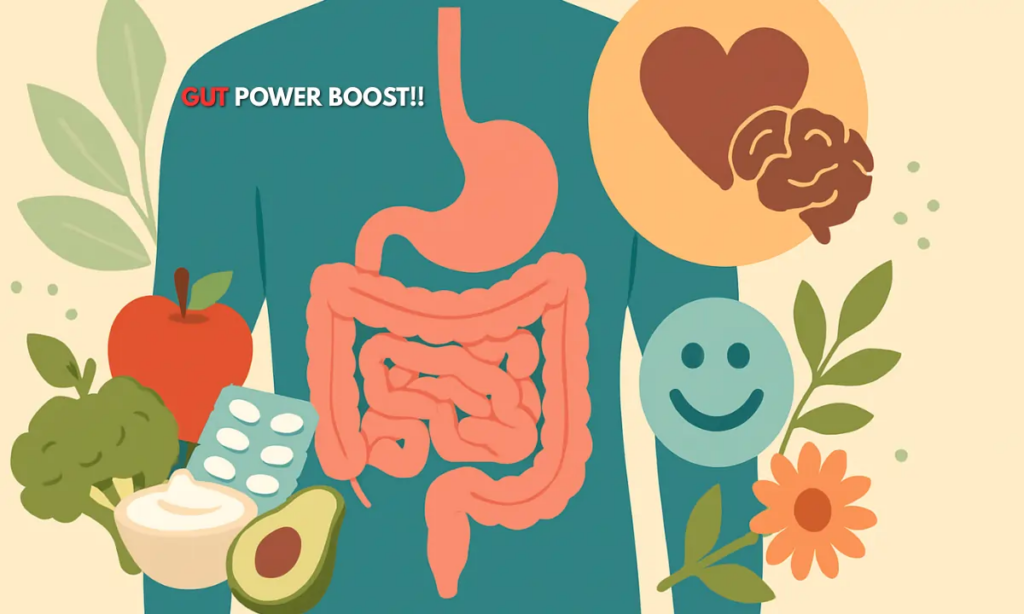
Gut talk used to be awkward small talk. Now it’s front-page science, podcast gold, and the poster child of wellness in 2025.
The irony? It’s been calling the shots from the inside out this whole damn time, while we were out here counting calories, slurping protein shakes, and demonizing carbs like they slept with our ex.
Now everybody and their grandma suddenly wants to know what their microbiome is doing—and honestly, it’s about damn time.
The global obsession with gut health isn’t just some new-age wellness cult or crunchy granola trend trying to sell you $70 probiotic spritzers. It’s a full-blown physiological reckoning.
People are waking up—bloated, foggy, anxious—and realizing that maybe, just maybe, the root of all this mess is living in their belly.
And not metaphorically. There’s an actual microscopic universe in there, and it’s throwing house parties, deciding how well you sleep, what mood you’re in, how you metabolize food, and even how often you get sick.
Your gut is basically the shady puppet master of your entire system—and we’ve been ignoring its text messages for decades.
What changed? Why now? Because modern living hit the gut like a truck.
Think about it: antibiotics like candy, fast food designed in labs instead of kitchens, sleep patterns that would make a bat confused, and stress levels that don’t just spike—they flatline.
All of that mess upends your gut flora. And once that delicate internal ecosystem starts collapsing, it doesn’t go quietly. It screams. Skin breakouts. Brain fog. Autoimmune flare-ups. Crippling fatigue. Anxiety that grips your chest like a vice.
This isn’t woo-woo talk—it’s clinical reality. The gut-brain axis isn’t a myth anymore, it’s the damn main character.
So now, in 2025, gut health isn’t some cute wellness goal. It’s a survival strategy.
And the data’s not shy about it either. Recent findings out of Stanford, Tokyo University, and a laundry list of top-tier research centers all point toward the same brutal truth: your gut is connected to your mental state, your weight, your immune defense, and your hormonal balance.
People are starting to treat probiotics and prebiotics like a daily ritual—not because it’s trendy, but because when their gut is off, everything’s off. Relationships suffer. Work crashes. Focus evaporates. Your body doesn’t just feel bad—it feels foreign.
The irony? A decade ago, “trust your gut” was just a figure of speech. Now it’s literal.
And while the wellness world milks this trend with beetroot lattes and fancy fermented shots, real ones know: it’s not about the gimmicks. It’s about undoing the decades of dietary damage. It’s about knowing that popping a collagen gummy while bingeing seed oils and ultra-processed snacks isn’t going to cut it.
People are finally, finally treating gut repair like a foundation—not a band-aid.
There’s also a quiet revolution in diagnostics. 2025 brought us at-home gut testing kits that make your blood pressure monitor look ancient. With one swipe and a few days’ wait, people are getting reports more detailed than their dating history.
They’re adjusting fiber intake, cycling probiotics, and scrapping food that doesn’t vibe with their internal ecosystem.
And guess what? It’s working. Not overnight, not flawlessly—but enough for people to stop mocking kombucha drinkers and start asking for their gut protocol.
This isn’t just about being less bloated or having more “regular” mornings. It’s about reclaiming energy. Stabilizing moods. Sharpening focus. And more than anything—getting back in sync with a body that’s been screaming from the inside.
2025 didn’t make gut health important. It just finally made us listen.
“The gut is not Las Vegas—what happens there does not stay there.”
So yeah, the stomach’s got jokes, but also? It’s got receipts. You just gotta be willing to read them.










You nailed it with the ‘shady puppet master’ analogy—so true how the gut quietly influences everything from sleep to stress. I’ve noticed a big difference in my mood and energy after focusing more on whole foods and fiber. It’s wild how interconnected it all is.